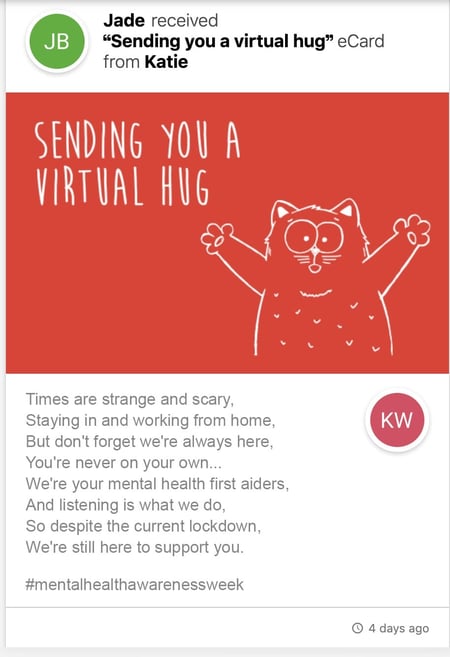5 min read
The world has changed. Over the past few months, many of our offices have been stripped of those organic “wow” moments that happen when people are working face-to-face. The hallway high five, the cheers, or (my personal favourite), the sound of a bell ringing when a team hits its weekly goal.
But even though our high fives may feel a little different, there’s never been a more important time to use recognition to fuel employee connections — to one another, to the business and to your core purpose. It’s so important to keep recognising, even if you are dealing with a newly remote workforce or a split between frontline and remote workers, to ensure that that culture of appreciation doesn’t slip away.
The progress principle and its application to recognition
For those of you who have read 'The Progress Principle' by Steven Kramer & Teresa Amabile, you’ll know that the most significant driver of engagement is making progress on meaningful work. So this is why the recognition of small wins is so important to our employees. This is why recognition of moving forward on a project (not necessarily completing it but ticking off a milestone) deserves a high five.
It's that high five that reinforces ‘you're on the right track’ and gives employees the confidence and energy to keep moving forward.
This is why celebrating when your team has worked hard on something and delivered some sort of change should still be a big deal, amplified even more so when they hit a specific result.
The book goes into detail around the everyday actions and responses of managers and peers, and illustrates to me how impactful manager-led recognition and peer-to-peer recognition can be. Reminding your people they're doing a great job in a timely and authentic way can make a big difference in people’s ability to make progress in challenging times like what we’re in now.
If we forget how to do this — how to recognise the progress — we’ll inadvertently put up roadblocks from helping them achieve their goals.

Replacing those organics moments I talked about can come easily by using a digital tool for recognition, such as a focussed reward and recognition platform. The amplification of great behaviour is especially impactful right now — especially from leaders as it supports employees along their progress pathways and encourages them to 'keep on keeping on.'
When a leader acknowledges or celebrates an employee publicly, the message to everyone is clear — do more of the same — that’s what the organisation is looking for right now to help us all move forward.

One of our clients, HomeServe, is an essential business, delivering home repair services globally to thousands of customers and facing a typical demographic of these times with part of their employees in the field, and part of their employees adjusting to a new work-from-home remote environment.
HomeServe has been a client of ours for 6 years, and are always pushing the boundaries when it comes to how they reward and recognise their 4,200 employees. To put an extra smile on their frontline workers’ faces, Sally Beardsmore, Occupational Health & Wellbeing Officer and her Mental First Aid Team pulled together a poem to thank their employees and remind them that they were there to help and support their fellow team members. They were able to distribute the poem to every single employee through a company wide eCard just in time for Mental Health Awareness Week. Here’s a peek at what got sent:

Our clients frequently work with our internal Design Team to create seasonal eCards like this to reflect the challenges their people are facing, and moments of recognition or support can help in a chaotic world. It’s stories like these that can put a smile on people’s faces, despite the challenging environment surrounding them. Going the extra mile and showing employees that you, as a business or as an individual, care, will keep the connection across the business sustainable for months and years to come. And it’s all the more important to take action now, before those connections fray from lack of care and attention.
Keeping recognition frequent and continuous, despite the environment
It may be worthwhile considering the frequency of positive reinforcement at this time too; in the absence of those frequent connections and nuggets of encouragement that happen organically in the office, employees will be looking for more external motivation to stay on track.
Research from Gallup highlights that committed employees get the motivation to create positive outcomes by receiving positive feedback at least once every seven days.
For managers implementing a “recognition ritual” is a great way to ensure you stay on track with this, so you might set aside 5 minutes every day after your all-team stand up to recognise at least one person in your team, as an example.
Watch our webinar on-demand: Maintaining Employee Morale while Navigating Uncharted Territory in the Workplace »
Showcasing the great work that is happening across your business at this time that is highlighting what employees are achieving and even how they are achieving it is an important part of helping others feel connected, and for them to understand how they too can deliver on purpose. Recognition can help employees with specific challenges at this time, such as reminding them of your company purpose, and helping them understand and accept how their role has changed or been “rerouted,” and boost morale across the organisation.
If the way you are delivering on your purpose has changed slightly — say you are a sales organisation which is taking fewer orders so you have diverted some of your sales team skills to project-based work — sharing the 'how' through recognition is a great way to highlight the behaviours that contribute to success and some of the new ways in which people are contributing to the organisation purpose.

Recognition has the added benefit of bringing people together. One of the most positive effects of having a culture that is rich in recognition is that you will rally together to celebrate more frequently and this will support your employees to build their relationships and fuel their sense of connectedness.
Lastly, recognition simply reminds someone why they got out of bed this morning — reminds them why they started their day today and that their contribution is meaningful. We are all human and we are all driven by making progress on meaningful work so when this happens we can’t help but smile, we can’t help but feel good and momentarily we forget the chaos of the external environment because we’re making an impact.
How are you recognising your employees throughout this crisis?

 Kylie Terrell
Kylie Terrell



